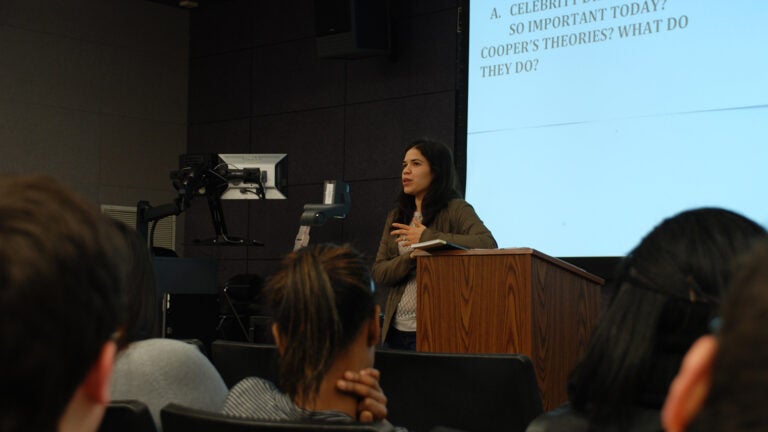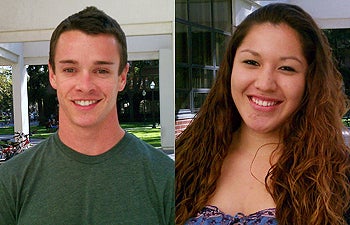
From Actress to Activist
In 2002, when America Ferrera was a freshman studying international relations in USC Dornsife, she was torn between two possible career paths.
At the time she had just appeared in two feature films: Real Women Have Curves and Gotta Kick It Up! But her studies at USC had lifted a veil on a larger world that she wanted to have a hand in improving.
This spring, she recalled her dilemma to students in professor Steven Lamy’s class “International Relations: Introductory Analysis” during a unit focusing on celebrity diplomacy. She visited the class to share her experiences working to advance national and international social causes.
“I always wanted to go to college and get my education although I always wanted to be an actor,” Ferrera told the students. “I never knew how those two things would work with each other and this was revealed to me in my first year of college here.”
During that year, in a moment of panic, Ferrera visited her international relations professor David Andrus to inform him of her plans to quit acting and pursue a career that would make positive changes in the world.
“Then he told me the most unlikely story,” she recalled.
Andrus had been mentoring a young Latina from the inner city and was having difficulty understanding her family dynamics. The girl told him: If you want to understand my life, you have to watch this movie. The film was Real Women Have Curves.
In the film, Ferrera depicts a young Mexican American girl whose family expects her to work and help support them — while she wants to pursue higher education. The situation mirrored the mentee’s own experience.
Watching the film prepared Andrus to meet with the girl and her family and discuss her dream to get an education. The story helped Ferrera make up her mind about her career, she said.
“What my professor really wanted me to understand was that my passion for acting and what I loved doing in the world had the power to be a tool,” she said.
“In that moment I realized that I didn’t have to give up what I love. I could find a way to link it to other things that I cared about.”
Ferrera has since worked tirelessly to forge that connection. While sustaining a successful acting career — as the eponymous lead in the television series Ugly Betty, for which she won an Emmy Award, and in a number of feature films — she has focused her efforts on making positive change.
In 2010, Ferrera partnered with Save the Children, a nongovernmental organization dedicated to improving the lives of disadvantaged children in the United States and around the world. As an artist ambassador she traveled to the village of Diassadeni, Mali, to help the organization raise funds to build a school.
“This is an example of how I met up with the right organization to work on an issue that was important to me,” she said. She used appearances on televisions shows where she was promoting a film or a play to point viewers to the cause.
Ferrera recently teamed up with New York Times columnist Nicholas Kristof to focus on the problem of human trafficking in India for a new documentary series called Half the Sky to air this fall on PBS. The primetime television special and multi-platform project is based on Kristof’s book co-written with his wife, journalist Sheryl WuDunn, Half The Sky: Turning Oppression into Opportunity for Women Worldwide.
In the documentary, Ferrera accompanies Kristof through the red-light districts of Kolkata, essentially becoming the audience’s eyes through which they learn about intergenerational prostitution.
“Nick and Sheryl are trying to create global awareness and a global campaign for women’s causes and slavery of the 21st century, and I’ve been very excited to be a part of that,” Ferrera said.
In 2011, Ferrera also met with President Barack Obama at the White House to discuss immigration issues with prominent Latinos in the United States.

Andrea Aldana (right) found Ferrera’s presentation inspiring. Kyle Hudson (left) said that her talk gave him a new perspective on ways to make change. “It made me think that there are ways to work at a political level and on a human-vested level,” Hudson said. Photos by Michelle Salzman.
Andrea Aldana, a freshman studying international relations, said Ferrera’s presentation was inspiring.
“I could relate to some of her feelings of being overwhelmed by all of the information you learn in class and also being at a crossroads for different career paths,” Aldana said.
“It’s nice to know that she found a common ground and that it’s possible to follow your passion and make a difference.”
Kyle Hudson, a junior studying international relations, said that it gave him a new perspective on ways to make change. “It made me think that there are ways to work at a political level and on a human-vested level,” Hudson said. “It’s cool to see individuals making an impact in ways you may not have realized you could.”
Ferrera, who took a leave of absence from her degree program to star in Ugly Betty, is working with Lamy to complete her bachelor’s in international relations in the upcoming school year. In her previous years at USC she was active in the Joint Educational Project (JEP) and the Teaching International Relations Program (TIRP), both housed in USC Dornsife.
Lamy invited Ferrera to share her unique perspective because it gives students someone real to learn from, someone who’s been where they’re sitting and can show them what they can do.
“She’s one of them,” Lamy added.
With Lamy as her adviser, Ferrera is writing a case study on celebrity diplomacy — how those in the public sphere use their influence to bring attention to global issues. But what it comes down to for Ferrera, is for all people to fight for social change.
“You guys have just as much a responsibility to think about what you care about and try to make a difference,” she said to the international relations students in class. “Nobody gets a free pass.”